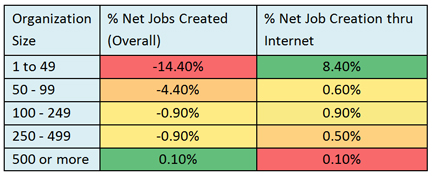SNG Study Shows Broadband and e-Solutions Linked to Business Growth
September 28, 2011by Michael Curri & Doug Adams
An SNG study of nearly 600 businesses in North Carolina has revealed a direct correlation between revenue growth and the adoption and use of e-solutions.
 According to the research, higher levels of utilization generate higher revenues and greater benefits for businesses. The most significant impacts on a firm’s bottom line are more sophisticated e-solutions such as teleworking, selling goods or services online, etc. – which means that firms that are not ‘fully online’ are missing out on significant potential revenue. In some cases they could grow by more than 30%.
According to the research, higher levels of utilization generate higher revenues and greater benefits for businesses. The most significant impacts on a firm’s bottom line are more sophisticated e-solutions such as teleworking, selling goods or services online, etc. – which means that firms that are not ‘fully online’ are missing out on significant potential revenue. In some cases they could grow by more than 30%.
By measuring over 17 activities classified as “e-solutions,” or Internet enabled applications, SNG has developed a Digital Economy index (DEi) which measures the utilization of broadband as a platform for innovation. DEi scores range from 1 to 10 (10 being highest), with higher scores reflecting the greater the number, scope and sophistication of the Internet activities deployed in an organization.
The data indicate that businesses with a high DEi, meaning higher levels of adopting and using e-solutions, experience larger percentage increases of revenues (between 27 and 31%).
SNG’s research thus demonstrates that increasing Internet utilization dramatically increases corporate revenues and job creation.
The Impact of Broadband on Jobs
The North Carolina study reveals that the Internet contributes significantly to job growth, especially among organizations with less than 50 employees who represent over 94% of all firms and 44% of all employment.
The table below shows a complex dynamic where large numbers of jobs in over 1,000 organizations were created and lost over a 12 month period in 2009/2010. As in any economy where there is job creation and job loss, the most important challenge is to drive net positive job growth. North Carolina is seeing job loss (as shown in “% Net Jobs Created”). The key is how many sustainable, knowledge sector jobs they can create through innovation.
As the column “% Net Jobs Created thru Internet” indicates, small, nimble firms (less than 50 employees) are leveraging the Internet and e-solutions and creating new jobs at a rate of more than 8% of their existing base, which is a significant difference from the over 14% decline in job losses overall.
 This picture of both job creation and loss is a more realistic insight into the process of economic change and development within North Carolina. One key finding from this table is that jobs associated with use of the Internet grew across all organizational sizes, even while major job losses were being experienced. This is particularly significant in organizations with 1 to 49 employees.
This picture of both job creation and loss is a more realistic insight into the process of economic change and development within North Carolina. One key finding from this table is that jobs associated with use of the Internet grew across all organizational sizes, even while major job losses were being experienced. This is particularly significant in organizations with 1 to 49 employees.
